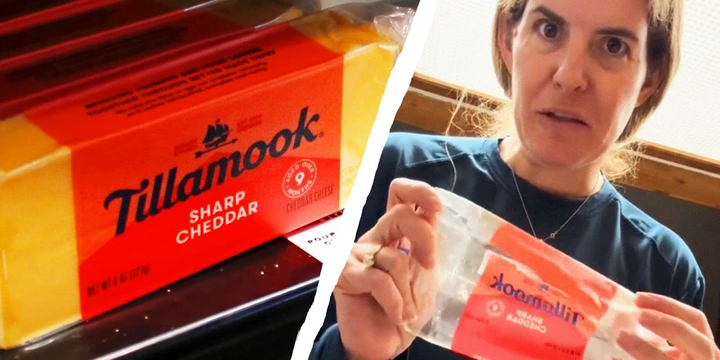‘This isn’t even real cheese’: Woman purchases Tillamook Sharp Cheddar Cheese, then examines the package more closely.
‘Nothing is off-limits.’

View pictures in App save up to 80% data.
In the United States, there is considerable debate surrounding which foods and food additives qualify as “natural” and which should be labeled as “artificial.”
While the Food and Drug Administration has guidelines about what it considers “natural” to mean, the agency does not generally define or regulate the label “natural” on food products.
The presence of this ambiguity, along with other terminology, has sparked significant discussions regarding what can be classified as "natural" or genetically modified according to American criteria.
A TikTok user has sparked a fresh debate by asserting that the Tillamook Sharp Cheddar Cheese she bought recently “isn’t even real cheese.” Here’s her reasoning behind this claim.
Yes, Tillamook Sharp Cheddar Cheese is a real product. It is made by Tillamook County Creamery Association, a well-known dairy cooperative based in Oregon. Their sharp cheddar is aged for a longer period, which gives it a distinct sharp flavor and creamy texture.
In a viral video that has garnered more than 135,000 views, TikTok user Taylor (@texasforeva) shares her reasons for questioning the authenticity of the Tillamook Sharp Cheddar Cheese she bought.
In her video, Taylor shares that she has been purchasing Tillamook Sharp Cheddar Cheese for the past six months to a year. During this period, she has been manually shredding the cheese instead of opting for the pre-shredded varieties.
Recently, as she was grating her cheese, she spotted something unusual on the label.
"Can you explain why it clearly states right here… 'Contains no animal rennet?'" she exclaims, brandishing the cheese package. "This isn't even genuine [expletive] cheese. There's not a drop of [expletive] milk in it. It doesn't mention 'No milk,' 'Dairy free,' or 'Vegetarian'... Everything has lost its meaning."
Rennet is a complex of enzymes that is traditionally derived from the stomach lining of ruminant animals, such as cows, goats, and sheep. It is primarily used in the cheese-making process to curdle milk, causing it to separate into solid curds and liquid whey. Rennet contains the enzyme rennin (or chymosin), which helps coagulate the milk proteins, making it an essential ingredient in many types of cheese production. In addition to animal rennet, there are also vegetarian and microbial alternatives available for those who prefer not to use animal-derived products.
For context, rennet is an enzyme or a mix of enzymes used in cheese-making to help milk coagulate, turning it from a liquid into curds and whey.
Although it is present in the stomach lining of young mammals like calves, there are also plant-based and microbial substitutes available.
Although Taylor claims that using one of these alternatives removes the milk or dairy from the cheesemaking process, this is not true. She cedes to this point in a later video, alleging that she meant to say “traditional” cheese rather than “real” cheese.